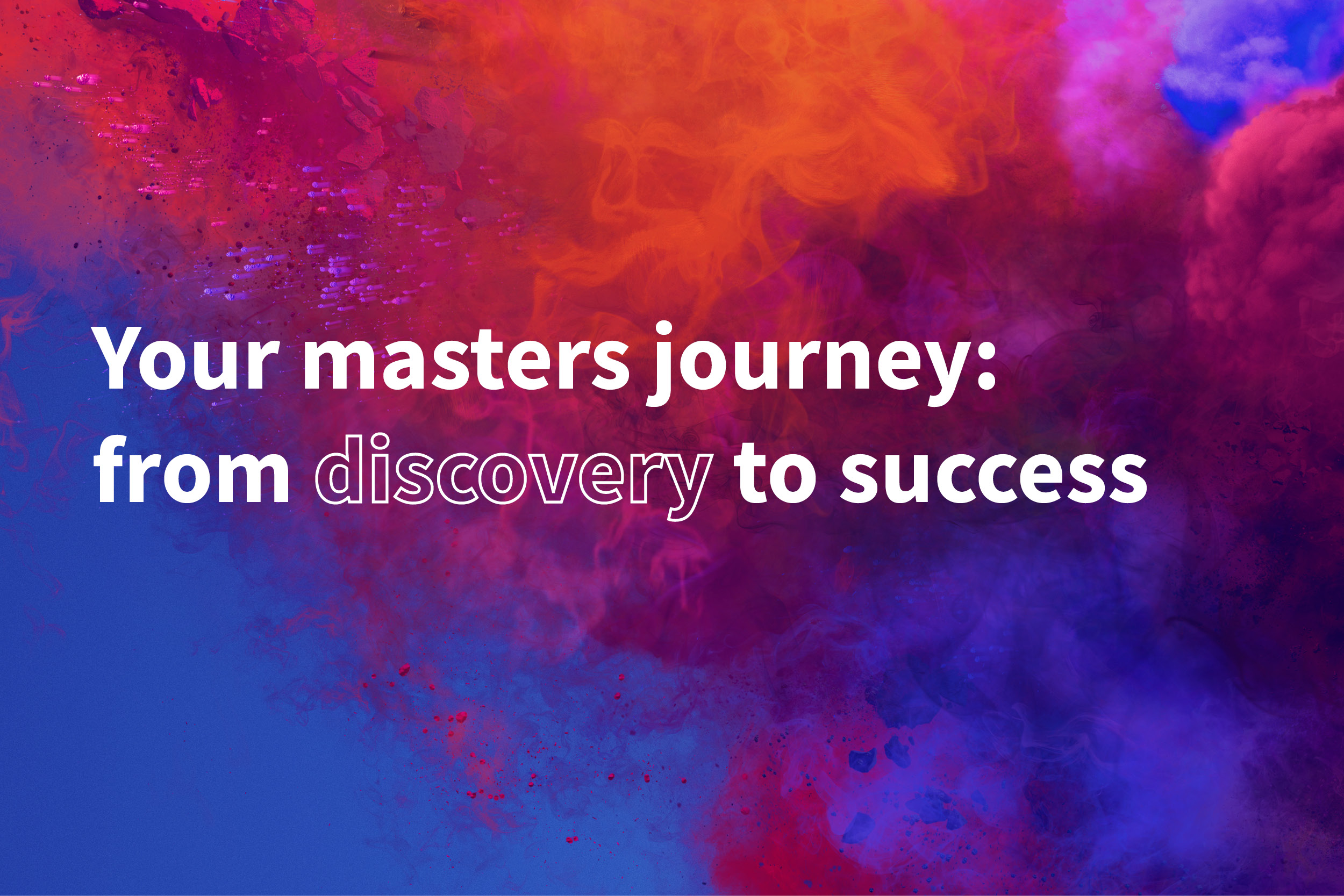Study options
- Starting in
- September 2025
- Location
- Mile End
- Fees
- Home: £21,500
Overseas: £33,500
EU/EEA/Swiss students
What you'll study
This programme aims to teach students to:
- Analyse the strengths and weaknesses of blockchain technologies as a whole.
- Apply the principles of blockchain technologies to real-life cases.
- Execute basic blockchain programming in Python.
- Critique the development of blockchain technologies.
- Effectively communicate with IT developers and the final users of business solutions.
You will cover a range of topics including entrepreneurship, economics and information technology, with an emphasis on how blockchain technology can be applied within these areas.
You will also have the opportunity to select optional modules on topics such as quantitative methods, business analytics, international business digitalisation and economic development.
Structure
- The programme is delivered across three semesters, with four modules taken per term.
- Ten compulsory modules will be taken across the entire year.
- You will be able to choose two optional modules in semester two.
- Students will typically have three contact hours per week for each module.
Compulsory/Core modules
The module provides a relatively non-technical overview of the use of statistical methods in business research. There is an emphasis on practical work and interpretation, and there will be extensive use of Stata, a statistics/econometrics package. The course covers the basic elements of: descriptive statistics, probability, sampling, inference, and multivariate regression analysis.
What is Bitcoin? What is a blockchain? This module introduces the conceptual and technical concepts behind Bitcoin, blockchain, and other aspects of the digital economy.
Python is a language with a simple syntax, and a powerful set of libraries. While it is easy for beginners to learn, it is widely used in many scientific areas including data science, machine learning and blockchain. This module is an introduction to the Python programming language for students without prior programming experience. Topics include algorithms and problem solving, data types, control structures, functions, arrays, files, and the mechanics of running, testing, and debugging.
This module is an introduction to cryptocurrency and blockchain programming for students without prior programming experience of building a blockchain. Students will learn key fundamentals of blockchain technologies and theories behind cryptocurrency transactions as well as practical training of creation of their own blockchains. Topics include how to build a blockchain, how to create a cryptocurrency, and how to create a smart contract. Although this module is not highly technical, it requires a basic level of mathematics and Python knowledge.
This module will provide an introduction to the methods and the tools of data science. The module will use the programming language Python and will cover the fundamental stages of data analysis workflow, including data collection, data pre-processing, exploratory analysis, statistical modelling, and business reporting. This will involve web scraping, merging and cleaning data sets, feature engineering, descriptive analysis and data visualisation, and applying various unsupervised and supervised machine learning models. The module will focus on applications in the general business management domain as well as the analysis of digital currency and blockchain data.
The module provides a deep analytical insight into ethical controversies in digital economy. Students will acquire knowledge of how ethics in digital economy contributes to sustainable management of the organisation in the long-term. The module focuses on ethical norms in blockchain technology and other areas of digitalisation. Students will build up their theoretical base from case studies.
This is an introduction to the emerging and important area of blockchain regulation and law, and how it may fit into the context of established legal principles. No law background is assumed.
The module focuses on the analytical frameworks of using blockchain technology to promote and secure the social impact. The elements of the module is to learn how blockchain technology is linked or can be further related to the digitalisation of the public sector (e-government). The students will gain analytical skills of how blockchain can be used in domains, e.g. digital identity, privacy protection, cybersecurity and e-voting. The most recent technological developments and the application are to be taught through case studies. The module overviews the current and future implementation and the use of blockchain technology by e-government in developed and developing economies.
The module provides a deep analytical insight into the roots of blockchain's social justice elements in the era of digital economy. Students will learn fundamental elements and principal of how blockchain technology contributes to accelerate, implement and achieve social justice not only in the individual economic systems but also globally in the long-term. The module focuses on the analysis of understanding a broader context of key elements of achieving social justice through the digitalization process. Students will build up their theoretical base from case studies.
The module focuses on the implications of entrepreneurial innovation on economy and organization. The central theme of the module is the exploration of the most recent technological developments and the application of blockchain technology in organizations and economy. The module overviews the strategic benefits of the implementation and the use of blockchain technology across the different sectors in the economy.
This 0-credit module covers Mathematics and Statistics topics which are useful for the different quantitative modules and MSc dissertations. The Mathematics topics include: linear and non linear equations, differentiation, growth and discounting and logarithms. The Statistics topics include: descriptive statistics, probabilities and distributions.
Elective modules
This course introduces contemporary theories and the empirical literature of the economics of developing countries with specific reference to public policy delivery. The course will address the problems with public policy delivery in developing countries and what solutions and strategies have been identified in the literature. The course will deal with debates such as centralised and decentralised delivery methods, political economy issues of corruption and state capture, and the role of incentives among politicians and bureaucrats in service delivery.
The module provides a non-technical overview of quantitative methodologies frequently used in finance and international business research. The module is data driven and covers the basics of: Hypotheses testing, OLS and Logistic Regression Analysis, Instrumental Variables, Time Series Analysis, Panel Data Models and Differences-in Differences. The module also teaches how to apply these methods using STATA (a leading econometrics software).
The structure and dynamics of various complex networks (e.g. World Wide Web, online social, intra/interorganisational, im/export trade networks) are examined. A unified theoretical framework to analyse sociologically relevant phenomena exhibiting complex dynamic network structures (e.g. information diffusion, cultural fads, financial crises, and viral marketing) is the aim. Innovation, to uncover the structural foundations of knowledge creation, transfer, sharing, and diffusion in various empirical domains is emphasised from an interdisciplinary perspective by combining current research on complex networks with contributions from relevant organisational and sociological research.
This compulsory module is taught in Semester 2 building on statistical methods in Data Analytics module in Semester 1. The module introduces students to the problem of causal inference, theories of causality and causal effects empirical methods. The focus is on randomised controlled trials in similar settings. Students learn about different econometric techniques to identify causal effects and their strengths and weaknesses. Data collection and organisation of real or natural experiments, data analysis and reporting results to non-specialists is covered.
The objective of this course is to examine how organisations develop and execute their international business strategies in a rapidly digitising business environment. Classic international business theories and concepts will be revisited in the light of evolving information and communication technologies. International business strategies (with a special focus on the global sourcing of IT) will be discussed. The course will involve a critical appreciation of contemporary developments and future trends.
This module integrates the theory and practice of innovation and entrepreneurship. We will also help develop your skills, abilities and behaviour towards entrepreneurial venturing, whether in established organisations or new ventures. Although business is an important context for this course, the process, skills and ideas we will address are also important for social, sustainability and third sector innovation, and intrapreneurial activities inside established organisations. We will also address broad issues about entrepreneurship, and how it can lead to social benefits and economic value. The module is intended to draw together learning from many different functional areas that students will have already covered in the past - marketing, strategy, finance, law etc. - and place these within the larger context of innovation and entrepreneurship. While we will discuss many tools, models, and frameworks that can assist innovation and entrepreneurship processes, a core focus within the course is to critically analyse and apply these ideas.
Assessment
Modules are assessed through coursework, essays, projects, presentations and unseen exams.
Teaching
Our interdisciplinary approach ensures a fully rounded business education, and includes lectures led by experienced academics and interaction with Queen Mary’s independent Virtual Learning Environment, QMplus.
You will gain hands-on experience using industry-leading software and take part in interactive seminars, presentations and lively group discussions with your peers.
You’ll be assigned an Academic Advisor who will guide and support you in both academic and pastoral matters, throughout your course.
Our lecturers also publicise their office hours, when they are available to give feedback and advice on coursework, on their online staff profiles.
Where you'll learn
Facilities
- ThinkPod interactive collaboration space with presentation, recording and video conferencing facilities.
- Free subscriptions to publications such as The Economist and Financial Times
- Access to a wide range of software packages, including STATA, SAS, EViews, Latex, MatLab, NVivo, Python and SPSS.
- 24-hour library on campus.
Campus
Teaching is based at Queen Mary’s Mile End campus, one of the largest self-contained residential campuses in the capital. Our location in the heart of London’s East End offers a rich cultural environment.
We have invested £105m in new facilities over the past five years to offer our students an exceptional learning environment. Recent developments include the £39m Graduate Centre, providing 7,700 square metres of learning and teaching space.
The campus is 15 minutes from Central London by tube, where you will have access to many of the University of London’s facilities, including the Senate House library.

About the School
School of Business and Management
The School of Business and Management has a reputation as a socially engaged management school, with an innovative, multidisciplinary, mindful and responsible approach. We invite our students to ask incisive questions, to challenge their assumptions, and to search for solutions to real-world challenges.
We ensure students experience innovative and engaging educational pathways, alongside supportive staff and excellent research facilities.
The School is accredited by the Association to Advance Collegiate Schools of Business (AACSB), which ensures that the highest standards of excellence in teaching, research, curriculum, and learner success are met.
In the most recent Research Excellence Framework (REF 2021), the School of Business and Management dramatically moved up the Times Higher Education rankings. Among 108 UK business schools, the School now ranks:
- 22nd for overall research quality (up from 39th in REF2014)
- 28th for research outputs (up from 34th)
- 12th for research impact (up from 24th)
- 21st for research environment (up from 59th)
Queen Mary is also part of the Russell Group - a body of leading UK universities dedicated to research and teaching excellence.
Career paths
This course could lead to a roles such as: Blockchain Developer, Blockchain Analyst, Cryptocurrency Analyst, Cryptocurrency Economist, Blockchain Entrepreneur and Blockchain Consultant.
Fees and funding
Full-time study
September 2025 | 1 year
- Home: £21,500
- Overseas: £33,500
EU/EEA/Swiss students
Conditional deposit
Home: Not applicable
Overseas: £2000
Information about deposits
Queen Mary alumni can get a £1000, 10% or 20% discount on their fees depending on the programme of study. Find out more about the Alumni Loyalty Award
Funding
There are a number of ways you can fund your postgraduate degree.
- Scholarships and bursaries
- Postgraduate loans (UK students)
- Country-specific scholarships for international students
Our Advice and Counselling service offers specialist support on financial issues, which you can access as soon as you apply for a place at Queen Mary. Before you apply, you can access our funding guides and advice on managing your money:
Entry requirements
UK
Degree requirements
A 2:1 or above at undergraduate level in , provided the degree contains good levels of study of Mathematics and Statistics. Subjects likely to contain sufficient quantitative elements include Mathematics, Sciences, Engineering, Computer Science, Economics and Finance.
Additional information
Students from less quantitatively oriented degrees, such as Accounting, Management, and Politics, are welcome if they have focused on the more quantitative elements of those degrees.
Find out more about how to apply for our postgraduate taught courses.
International
English language requirements
The English language requirements for our programmes are indicated by English bands, and therefore the specific test and score acceptable is based on the band assigned to the academic department within which your chosen course of study is administered. Note that for some academic departments there are programmes with non-standard English language requirements.
The English Language requirements for entry to postgraduate taught in the School of Business and Management falls within the following English band:
Band 4: IELTS (Academic) minimum score 6.5 overall with 6.0 in each of Writing, Listening, Reading and Speaking
We accept a range of English tests and qualifications categorised in our English bands for you to demonstrate your level of English Language proficiency. See all accepted English tests that we deem equivalent to these IELTS scores.
Visas and immigration
Find out how to apply for a student visa.








